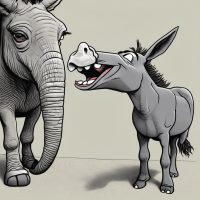If you’re like me, you spend a significant amount of your day, week, month, life on social media. It’s entertaining, distracting, and, oddly, satisfying giving you a sense of accomplishment when you’ve really done nothing at all… or have you?
One of the things that social media does is expose you to other people’s ideas, opinions, and interests, and science says that other people’s ideas, opinions, and insterests shape our ideas, opinions, and interests. Remember the thing your mom used to harangue you with, “If everybody jumped off a cliff, would you?” And George Carlin’s retort, “Yeah, because I’d be a fool not to.” And, the saying, “A 1,000 Chinese people can’t be wrong”? They are all getting at the same thing: if a majority of people in your awareness are doing something or believing something, then it must be right. Just as we learned from our deep dive into Leon Festinger’s cognitive dissoance last September.
We can’t know everything. Individually we are pathetic and week — sorry John McClane, it’s true. Any self-respecting bear, leopard, or tiger could take us in a moment and, science fact, as this YouGov poll suggests, most people seem to realize it. But, put us together in a group, and we’ll push any and all species to the brink of extinction, including ourselves, and we’ll commit unspeakable atrocities against one another along the way! So, hah! Take that John McClane! Did your rugged-individualist-rogue-breaking-all-the-rules-because-you-know-you’re-right self ever drive even one species to extinction? Hunh? Nooooo! Well, humanity as a collective whole has nearly destroyed the life supporting capacity of the entire planet! How’s that for collectivist action beating individualists? Take that! In your face!
This ability to work together to combine our skills and knowledge to accomplish gigantic tasks is known as collective intelligence. We on the left like to think that it is only the gaslighting groupthinking rank and vile MAGA Nation-types and back-bencher political hacks that are vulnerable to all of the cognitive dissonance that collective intelligence leaves us vulnerable to, but we ain’t. We on the left are as susceptible to it as any human ever born. We just don’t seem to plunge so whole hog into it as the other side does.
That’s why it is troubling to see Tweets like these showing up in all my social media timelines:
I can hear all my liberal social media yelping about how we know it’s true, and Trump and friends are guilty, and they oughta be in jail. Didn’t Mueller already say that Trump obstructed justice? Isn’t Trump Individual Number 1? Isn’t that enough to indict him? Arrest him? Prosecute him? Convict him? Throw him in jail? we know it’s true!
Now, hold on there, Charlie. How do you know it’s true? (a) Mueller did kinda sorta say it in testimony before Congress. That’s true. (b) Michael Cohen’s indictment did name Trump as a co-conspirator. But, (c) that’s not the same thing as building a case against someone.
That feeling of certainty and our resulting impatience when the obvious next step isn’t immediately forthcoming is actually dangerous. It causes fatigue, despair, and feuls discouragement. We can become so jaded that we stop participating in the system.
There are four psychological phenomena that drive this knowing: the like-want system, the mere exposure effect, and flashbulb memory or emotion-strengthened memory We’ll take a brief look at each.
Like-Want System
The like-want system kicks in when we do something that is immediately followed by a “reward,” or something we like, like when you smile at someone, and they smile back, let’s say. It makes it much more likely that the behavior that is associated with the reward will be repeated.
Both systems rely on dopamine — a chemical molecule called a neurotransmitter that causes neurons to work together in a circuit — which is released when stimulated. The output of the system is that feeling of wanting more. Anytime you’re doing something like playing an electronic game or scrolling social media or watching a show and you want just one more, you know the want system is involved. It put the binge in binge watching. Never mind that you can no longer remember many details of the program or remember what happened in each episode.
The Like and Want of Social Media
Social media rewards us with follows, likes, shares, and comments. When we get some, we want more of them. There is a whole science built up around it called persuasive design. If you can get an activity to activate the like-want system, you can get people to do a thing for just about ever. It’s what Fox News uses to keep your favorite drunk uncle watching, believing, and acting on their propaganda.
The like-reward system drives most social media influencers. They want those follows, likes, shares, comments. Ever see those posts that says something like, share if you want Trump to be indicted! Trolling for shares. I want to follow you if you hate Matt Gaetz! Trolling for follows. It causes some of them to make claims that maybe they shouldn’t.
There was a fad of social media types predicting that subpoenas would drop on Trump and others. And, just like with Jean Dixon, when someone hit it even though they made dozens of predictions and maybe only one came true, many people thought it was proof that they knew something! When one influencer made a prediction, it set off a cascade of predictions among all the influencers. It works the same for the punditing heads on all the punditing TV shows, too.
Mere Exposure Effect
We evolved to believe our senses. When you think about it, of course we did. Why would you disbelieve your senses on the hunter-gather savannahs of our forebears? The people who dithered when the charging rogue elephant was crashing through the bush died, and their genes were removed from the gene pool. If you were wrong about the elephant, who cares? You ran away for nothing. But, if you were right, you saved your life.
When we see something, we believe it. It is why CGI and deep fakes are so effective. This is also true for the things we hear. Reading is just an extension of hearing; it relies on the same brain hardware with a few visual components roped in to help out. So, when we encounter a claim a second time, we tend to think it’s true even if it’s been discredited. It’s the reason the propagandists say that if you tell a lie often enough, people will believe it.
Mere Exposure to Social Media
If everyone around you believes something is true, we conclude that it is true. So, think about it. We live in a world where we have social media influencers who are being driven into a competative frenzy to get followers, likes, shares, and comments by their liking-wanting system so they make outrageous falacitious predictions about who is going to be indicted and when. We see them, and the next time we see them, we are all the more convinced they’re true because the mere expsure effect has painted them with a thin veneer of truthiness (sorry Stephen Corbert).
Emotional Memory or Flashbulb Memory
Science tells us that our strongest memories are those that are associated with an emotion. That’s why PTSD is such a debilitating condition. It is essentially a memory that is associated with a strong fear reaction. Again, our hunter-gather savannah-dwelling ancestors really needed those strong emotion-based memories. If fishing in a log-strewn river resulted in a crocodile, all you’d need is to see a log floating in the river, and BAM! you are terrified thinking that a croc or hippo is going to come outta that river and try and eat you! It helped save your life by making memories of life-threatening events readily available.
We call those memories flashbulb memories. When an event is personally significant and sufficiently emotional, it produces a strong memory of the event. One that we are likely to brood and ruminate over and discuss when we get a chance. Recalling a memory makes it stronger, so all that brooding, ruminating, and discussion just makes the memory of the emotional relevant event all the stronger.
What happened on 7 January 2021? We was all talking about the 6 January Insurrection, right? Hell, we’re still talking about it. It is a flashbulb memory. It was personally significant — the violent overthrow of our government — and it produced a strong emotion — fear. We’ve talked about it frequently since then.
The Emotional Memories of Social Media
Predictions of subpoenas are about the same. They are personally relevant and emotional, so we remember them much more easily and are inclined to talk about it or at least jump on the social media bandwagon commenting on it, too.
With all the rash talk of subpeonas about to drop, we all have strong emotional reactions, so those memories are easily accessed. When they don’t happen, we are disappointed. The danger in being disappointed is that it leaves us jaded and disaffected. We begin to believe that the system is not working, our participation doesn’t matter, and we are less likely to vote, participate in campaigns or GotV drives, or donate money to small dollar campaigns.
Instead of Being Discouraged
Instead we must remind ourselves that we live in a huge vastly complex society, and we must rely on the experts and professionals to make good sound judgments based on our social norms, laws, and traditions. If there is a lesson from all of this, it isn’t that Garland and the DoJ are ignoring everything and violating our trust, it is that the Executive Branch has encroached on the Legislative Branch’s powers and needs to be reigned in. That means more activism and contacting the White House to demand that some of the bloated powers of the executive be rescended and left to Congress.
Lastly, there is such a strong tempation to act on what i know to be true!!! to go all John McClane and break all the rules in order to achieve “justice,” but that is exactly what folks thought they were doing during the 6 January Insurrection. Locking people up without due process is what happens in an authoritarian regime not in a democracy.
So, let’s call our members of Congress and the White House frequently and often to let them know what we think about the day’s events and what they should be doing about it. Let’s try and remember what is at stake and what is involved in maintaining a successful healthy democracy. And let’s try and curtail our worst instincts and impulses. We don’t want to become like the MAGA Nation.

If you agree with this opinion and like the psychology that supports it, subscribe to the blog!
Image Attribution
“sports social media” by Sean MacEntee is licensed under CC BY 2.0
Categories: Social Psychology

























Reblogged this on cabbagesandkings524 and commented:
Calico Jack – Delayed gratification?
LikeLiked by 1 person
An odd synchronicity: Reading this and listening to this – https://www.npr.org/2021/06/23/1009339859/bidens-attorney-general-explains-controversial-decisions-related-to-trump
One thing involved is our general tendency to confuse individual issues and institutional ones, and institutions move (with good leadership) much more slowly and deliberately (meaning, with deliberation) than individuals. We also confuse the individual with the office, the President with the Presidency, especially when the one is damaging the other by violating norms and traditions.
When you hire good professionals, it is wise to let them be to do their job. That can require the practice of patience.
LikeLiked by 1 person
Howdy Bob!
I think you’re right there. I think it is a combination of the easier question and halo effects. It is easier to think of the office as the person holding it, and, if you like the person, assume everything they are doing is right and good. It’s one reason Walter Shaub is catching so much grief for decrying Garland’s defense of Trump’s abuses of the presidency. We want to think of Garland as being one of us (the false consensus effect) and looking at the “obviousness” of the evidence against Trump and Co. When that gets burst, it can bring a terrible backlash. Just another reason that Schumer and Pelosi have to find a way to pass legislation.
Interestingly, on the legislative score, Sinema may be the more difficult piece to get complaince from. Manchin seems to have been exactly what he says he was, sincerely seeking compromise in the belief that ten Republicans would vote with them. Now, he seems to have cottoned to the unlikeliness of that happening. Sinema on the other hand strikes me as being much more of the contrarian personality disorder. She’ll be against whatever everyone else is for, even if she was once for it — she was a co-sponsor of the For the People Act, for example — and then find it impossible to go along with the majority when some of her demands are met.
It is easy to see them both as being nefarious, but I think that they are exactly what they seem to be. Jumping to the conclusion — as I have done deriding both of them as bought and paid for given the contributions to their campaigns by conservative PACS — that they are traitors to the party is part of propotionality bias — the size of the cause must be in proportion to the size of the cause.
It sounds like the Senatorial Dems are working their way around to modifying the filibuster and passing legislation with or without Republican support. Hopefully, that is so. Hopefully, Biden’s personal tete-a-tete with Sinema will have an effect of getting her on board with the necessary changes; otherwise, it will be a long four years until the rest of her term is up.
Huzzah!
Jack
LikeLiked by 1 person
I was thinking about bipartisanship and history. Prior to the Voting Rights Act, Civil Rights Act, and the Southern Strategy, both parties were split coalitions. The Democrats had three parts, Ivy League Liberals, Big Labor Populists, and Dixiecrats. The Republicans had Big Money Wall Street Management, Ivy League Conservatives (William Buckley types), and Western Prairie Populists, and off to the side, The John Birch people. This is what made bipartisan legislation possible. Since Nixon showed the effectiveness of the southern strategy after the GOP absorbed the Dixiecrats, the purification of the Republican Party began, leading to a new coalition of Big Money Libertarians, Evangelical End Timesers and Theocrats , and White Supremacists, with a lot of crossover memberships in those categories. Much of the shift toward the center-right by the Clintonesque neo-liberals was pushed by the loss of Big Labor as an effective partner with the Republican success in destroying or co-opting unions and their members. The result is that bipartisan legislation is all but impossible except under the heading of National Security in the face of a mutually agreed threat, real or imagined. If the filibuster is removed, we are very much more like a parliamentary system, but without the multiplicity of parties and the vote of no confidence.
LikeLiked by 1 person
Howdy Bob!
Thats an excellent analysis of the ways the coalitions and organization of the parties has changed over time. I think it coincides with the disappearance of earmarks which gave both parties incentives to make deals.
Without any incentive to horse-trade, the parties lost incentive to compromise. Any goods and services that were brought home to their districts and electorate had to be done through straight-party votes. The Republican goal of a smaller government really disincentivized them from delivering government services to their electorates. It promoted the influence of business and industry within the party. Business and industry would deliver the goods and services a la Cancer Alley in Louisiana.
No where is this more apparant than in Texas right now where they’ve done nothing to mitigate the damage done by their dysfunctional powergrid. Instead, they pass social grievance laws about abortion, guns, and xenophobia and expect their citizens and their survivors to pay their utility bills regardless of quality of service.
Huzzah!
Jack
LikeLiked by 1 person
Let’s not forget the politicization of responses to COVID from mask wearing to vaccination. There is, perhaps, no better proof of the deep dysfunctioality of the system as it stands than that, unless the goal is to kill more POC than White people, and the white ones that die are expendable and acceptable losses. In a way, that goes for the victimized utility customers in Texas as well.
A discussion group I am in recently started considering “Cast” by Isabel Wilkerson. Part of the message is that virtually everything in public policy in this country needs to be looked at through the lens of structural racism.
LikeLiked by 1 person
Howdy Bob!
I think that is why the GQP is so freaked out by Critical Race Theory. While it is focused strictly on laws, it suggests that many laws have negative impacts on Blacks and other POC’s, and those negative impacts need to be mitigated. If we want a more perfect union, we need to root out systemic structural racism in our laws, policies, and norms.
Huzzah!
Jack
LikeLiked by 1 person
After Obama won, the GOP set up a committee to study what they needed to change. The advice was that they needed to make a bigger tent, bring in and listen to POC, to seriously try to go to where those voters are. Instead, the party ran the other way. That pretty much tells us what they really value, and what they really fear.
LikeLiked by 1 person
And what they really want. They really want to meet their own needs, and by their needs I mean those of their hidden big money donors, at the expense of the American middle class.It is our disbelief that any American would be working against our national interest that keeps us unable to effective counter them.
Huzzah!
Jack
LikeLiked by 1 person
So it has bee for a long time: “The business of America is business.” Calvin Coolidge — Well, at lease he was honest about it. Now, it is behind the smoke screen of hot-button emotional distraction issues.
LikeLiked by 1 person
Howdy Bob!
Coolidge was just an echo of the Gilded Age. That’s what they’ve all been trying to get back to since we departed from it. They must’ve thought that Nirvana had sprung up on earth during the Roaring 20’s. How crestfallen they must’ve been in the 30’s during the Great Depression. It took them fifty years to get reorganized and back on track after that and ninty to arrive at the cusp of finally achieving their dream of a return to the boom-bust cycle of robber baron capitalism.
Huzzah!
Jack
LikeLiked by 1 person
Listen to the Amazon warehouse workers and chicken processing workers, then read The Jungle by Upton Sinclair.
Another quote:
“Liquidate labor, liquidate stocks, liquidate the farmers, liquidate real estate. It will purge the rottenness out of the system. High costs of living and high living will come down. People will work harder, live a more moral life. Values will be adjusted, and enterprising people will pick up from less competent people.” Andrew Mellon
LikeLiked by 1 person
Howdy Bob!
Amazon that goes through 150% of its hourly wage earners every year and fears that there aren’t enough people in the US to fill their posiitions because of it. When you turn 150% of your staff over every year, you’re doing something wrong. It’s not just the chicken processing workers, it is the contract chicken farmers, too. They’ve got those folks by their gonads.
We’ve demonstrated that people work hard when they think there is a good reason to, like self-improvement through earnings. Once a certain level of income is achieved, income ceases to be a signficant motivator. Motivation comes from being a valued team member and contributor to the group goal. But, we also know that the profit motive also drives excesses that hurt people. The collapse of the condo down on Maimi Beach demonstrates that aspect the most since repairs were recommended in 2018 and not done because cost. We have to have government to curb our worst excesses and promote the common good.
Huzzah!
Jack
LikeLiked by 1 person
The Amazon case is, it turns out, partly a matter of policy and philosophy from Jeff Bezos’ not wanting the work forces “to get stale”. thinking that constant turn over is good. It makes it in a way part of the Gig Economy. It turns up in the movie Nomadland, in which people travel about often taking short term jobs at different Amazon locations. They don’t care how many times you quit, and rehire former workers easily. I think that at some point they will have to consider how to reduce the turn over rate.
At the other end of the pay scale, I’ve often thought about the claims that high marginal tax rates on large earners will decrease motivation. It didn’t happen in the 1950s. The reasons vary. For some, it is that the pre-tax number is how they keep score with their peers, and they are very competitive. Others who may want more yachts, houses, or Italian sports cars, simply have to work that much more to get them. And then there are those who love, or are addicted to the game they are playing regardless of the money.
We are suffering from 40 years of the idea that the only obligation of corporate managers is to maximize shareholder value without other pro-social considerations.
LikeLiked by 1 person
Howdy Bob!
I always thought the if-you-increase-taxes-on-the-wealthy-they-won’t-invest thing was just something used to scare off the rank and vile voters. Rich people are going to do what they have to increase their wealth. They figured out that if they bought politicians, they could change the tax laws. Suddenly, the only thing that mattered were profits and maximizing income. I’m not as familiar with the exact history of how all this came about, but I remember the changes in emphasis as we talked about wealth and the purpose of America and how business worked from the late ’60’s onward. By the ’80’s, it was all cocaine fueled give me give me give me.
Huzzah!
Jack
LikeLiked by 1 person
What the voters have been taught to ignore is that high marginal rates on the wealthy and corporations actually drive investment. Capital investments are, like other costs of doing business, tax deductible. People with serious money understand that and use investment to avoid paying taxes. Our recently former president is a prime example, even if many of his methods turn out to be fraudulent.
LikeLiked by 1 person